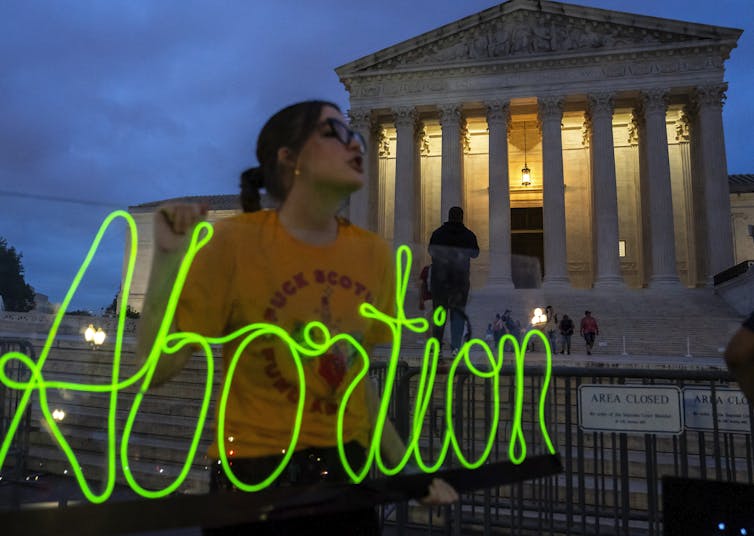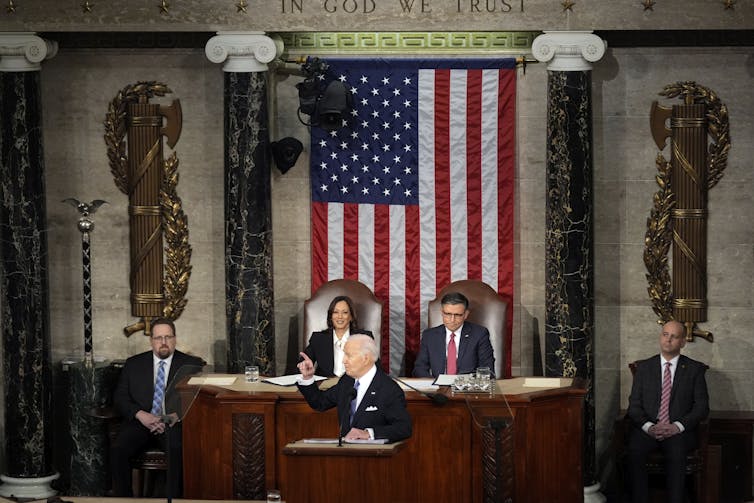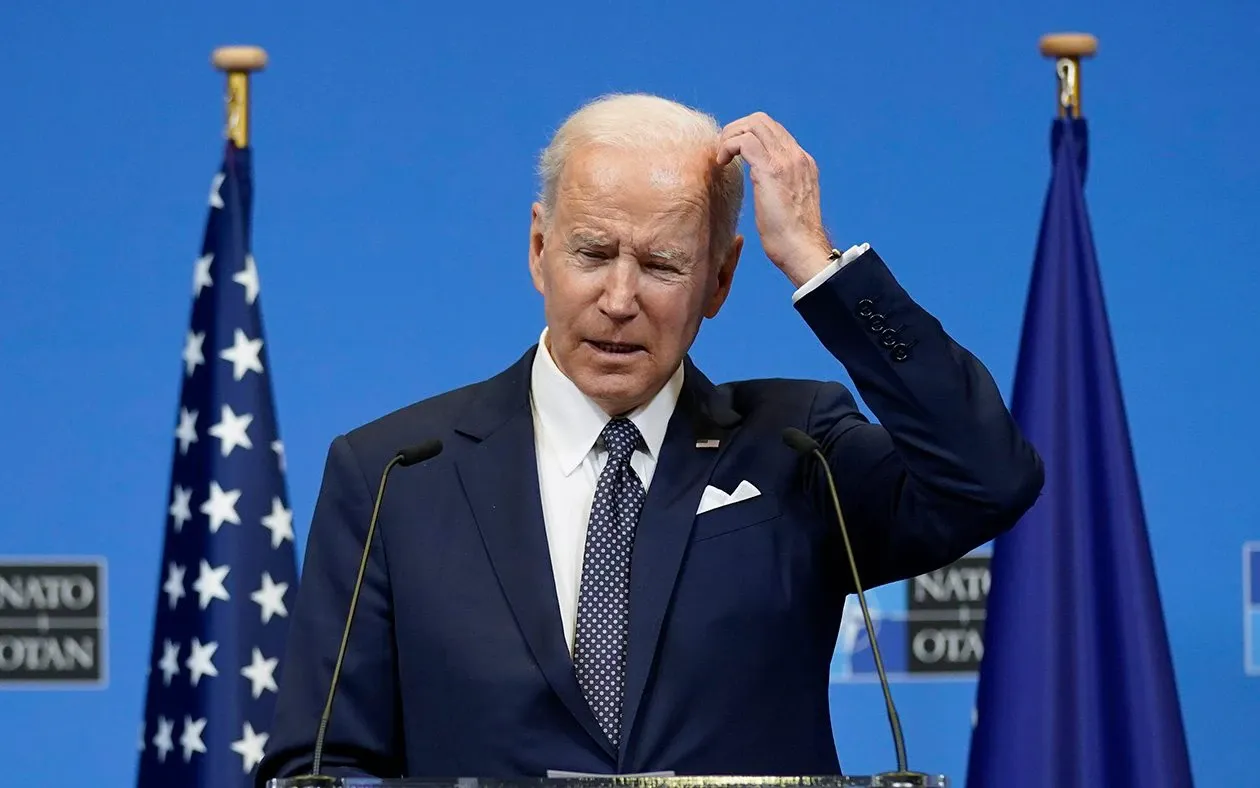Table of Contents
Naomi Cahn
Professor of Law, University of Virginia
Alan Morrison
Professor of public interest and public service law, George Washington University
Sonia Suter
Professor of law, George Washington UniversityNaomi Cahn, Professor of Law, University of Virginia

President Joe Biden promised during his State of the Union address on March 7, 2024, that he would make the right to get an abortion a federal law.
“If you, the American people, send me a Congress that supports the right to choose, I promise you I will restore Roe v. Wade as the law of the land again,” Biden said.
If Biden meant simply that he would sign a bill enshrining the right to an abortion, then he can keep his promise. But, as he noted, such a bill is unlikely to be enacted by this current Congress, in which the House majority is Republican. Moreover, if Biden expected such a law to be upheld by this Supreme Court, or even a different set of justices, he could be seriously disappointed.
On the other hand, there is much that Biden’s administration and Congress can do to offset the impact of the Supreme Court’s 2022 Dobbs v. Jackson Women’s Health Organization ruling, which removed federal constitutional protection for the right to get an abortion and sent the regulation of abortion back to the states.
As experts on constitutional law and reproductive health and justice, we are sorting out just what the federal government can do to protect access to abortion.
Most Americans think of the federal government and the president as capable of doing anything that a majority of Congress thinks is appropriate. But that is not true.
The president has various powers under the Constitution, including the authority to issue executive orders.
That’s what Biden did shortly after the Dobbs decision when he issued an executive order that called on different government officials and agencies to promote access to reproductive care, including abortion.
Biden can also have government agencies craft rules that protect abortion rights. The Department of Health and Human Services, for example, has proposed a rule to increase privacy protections for reproductive health information, including abortion information.
But Biden has only limited authority to do this: These efforts could be undone by Congress overriding executive orders – or his successors reversing them – and courts invalidating agency decisions.

Congress’ hands are partially tied
Biden specifically said in February 2024 that he needs a Congress that will help him support a “woman’s right to choose.”
Two of us have written about how Congress does not have the authority to override a state’s decision to make abortions unlawful in most circumstances – although we recognize that some observers and experts would question this conclusion.
Congress has the power to pass laws, but only on a limited list of subjects. While the understanding of Congress’ power has expanded over time, there are still very real limits.
Congress is able to regulate commerce between states, but the Supreme Court has determined that its powers only reach activities that are economic in nature. So, the court ruled in 1994 that the federal government could not ban the possession of guns in a “school zone,” since there was no direct economic element involved.

Other options for protecting abortion rights
The president and the federal government have other ways to make it easier and more affordable to get an abortion. Some of these methods might even be effective in states where there are partial or full bans.
First, Congress could amend existing federal laws to provide economic assistance for abortion. For example, it could repeal the Hyde Amendment, which is an annual restriction passed in 1976 that prohibits federal money from being used to fund abortions, except when necessary to save the life of a pregnant person or when a pregnancy is the result of rape or incest.
Biden promised to remove the Hyde Amendment in his 2020 campaign but has been unable to do so because of lack of congressional support. But eliminating the Hyde Amendment would have minimal impact in states with abortion bans.
Second, some states with abortion bans, like Idaho and Alabama, are threatening to prosecute women who travel to another state to get an abortion. Congress could enact legislation that protects the right to interstate travel for an abortion. Congress could also make it a federal offence for anyone, including state prosecutors, to interfere with that right.
Justice Brett Kavanaugh, in his concurring opinion in Dobbs, asserted that if states criminalized interstate travel for people to get an abortion, those laws would fail “based on the constitutional right to interstate travel.”
Since Dobbs, Idaho has passed a law making it a felony for adults who are not the parent of a pregnant minor to help that minor cross state lines for an abortion. A district court has temporarily stayed this law as unconstitutional. In addition, four counties and a few cities in Texas have passed so-called “abortion trafficking laws,” which allow individuals to sue people who travel to get abortions out of state and those who help them.
Third, the Food and Drug Administration has approved, and in 2016 and 2021 expanded, the availability of mifepristone, one of the two drugs used for medication abortions. The Supreme Court is considering a challenge to some of the FDA’s rules about access to mifepristone and will hear oral arguments in that case on March 26, 2024.
But even if the FDA prevails, an anti-abortion president could replace the head of this federal agency. The FDA might then rescind the current rules that have expanded access to mifepristone, including allowing the pill to be used later in pregnancy.
To prevent that from happening, Biden could ask Congress to pass a law that would guarantee the same kind of access to mifepristone that the FDA currently allows.
Congress could also ensure that mailing abortion pills is legal. It could do so by repealing a Victorian law called the Comstock Act, which some judges have interpreted as prohibiting the mailing of abortion pills, and directly declaring that such acts are legal.
The Department of Justice issued an opinion in 2022 that the Comstock Act does not override the FDA rule allowing mifepristone to be delivered by mail. But legislation would make it impossible for a future president to reverse that opinion alone, or reverse that decision without congressional approval.
Biden’s actions could still matter
Biden’s attempt to explicitly codify Roe would probably not succeed.
But Biden can recommend that Congress undertake many other legal reforms that are not constitutionally barred, and he could also take some limited actions based on his own authority. These could remove some obstacles to getting an abortion.
This article is republished from The Conversation under a Creative Commons license. Read the original article.









